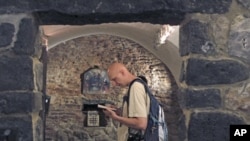The bloody crackdown ordered by President Bashar al-Assad against protesters throughout Syria is having an effect on the nation's economy. International condemnation of the military assaults have prompted trading partners in Europe and elsewhere to hold off on business dealings, and tourists have been scared away.
Nabil Salha lives in a little mountain resort town called Mashta Helou. The town boasts the best of both worlds: the cool air of the mountains, and beaches just a short drive away.
Salha usually works as a guide for the flocks of tourists who come to escape the summer heat. But not this year.
"There’s no tourism this year," he said, "because for a tourist to reach the resort he needs to drive down a highway with loads of police and army stationed on it.”
The police and army are there to clamp down on anti-government protests. Salha says there aren’t any problems in his town, which is mainly Christian. But he said in nearby villages and towns there have been clashes between protesters and security forces. So this summer he's gone to Lebanon to stay with his mother.
“We are living without work in Syria,” he said. “My father is getting his pension - but it’s not much."
Salha says he is losing about $1,000 a month and hasn't worked for three months. He said he is borrowing money from people, and going into debt.
Other Syrians in the tourism industry also are suffering.
Reports suggest hotels in the tourist hubs of Damascus and Aleppo are empty. Tourism makes up about 12 percent of Syria’s $52 billion economy.
Hilal Khashan of the American University of Beirut said the the uprising, and the government’s refusal to make meaningful reform, have put a serious strain on the economy.
“There’s no tourism, no transit. There’s a flight of capital from Syria. The economy is not in full gear,” said Khashan.
Gulf Arab and foreign companies have delayed or cancelled huge projects in Syria. The stock market there has dropped 41 percent. Economists say the gross domestic product, projected earlier this year to grow at 3 percent, may shrink by 5 percent.
Khashan said the greatest threat now facing the Assad government is not the protests - it’s Syria’s collapsing economy.
"Those middle class people who have secure jobs and send their kids to school and can afford to go to super market and live fairly decent by Syrian standards will begin to realize the Assad regime has become a liability," said Khashan.
Many of those middle class people live in Aleppo and Damascus, cities that have yet to see significant protests. Khashan said people in those cities have benefited from Assad’s economic liberalization, and found stability with the regime, but…
“If the elements of good life they are enjoying seem to be endangered, they may change their minds,” said Khashan.
One example came last week. Syrians found that their credit cards stopped working due to U.S. and European sanctions on Syrian banks.
But it’s the rural poor who’ve suffered most under Assad’s decade of economic reforms. He cut subsidies on fuel and food, lowered investment in agriculture and cut government jobs. Now in the face of growing unrest, Assad has increased subsidies, and raised wages in the large government bureaucracy.
Syria used to bankroll the subsidies through its oil exports. But those exports are dwindling.
The European Union has been the number one buyer of Syrian oil. Now sanctions could bar EU countries from importing Syrian oil.
Economist Lahcen Achy said sanctions in general could wind up hurting Syria’s poor and working classes - the very people who are protesting.
“And the issue is that the effectiveness - it still might take a long time. A regime can survive for a long time. Iran, Iraq, Libya, etc.," he said.
Achy said economic sanctions can only do so much. He said political and diplomatic pressure is the best way to push Assad into enacting real reforms, or stepping down.
Salha, the unemployed tour guide, doubts the tourists will come back to Syria any time soon. And he doesn’t see any end in sight.
“I’m afraid from both sides” he said. “If the regime is toppled there will be chaos. And the opposition has no leadership." Salha said "there’s no one to take over if Assad leaves." At the same time, he believes that the Syrian president will not make any meaningful reforms that will calm the protesters.
For now, Salha is staying in Lebanon, looking for work as a tour guide here.
Crackdown Hurts Syria's Economy
- By Ben Gilbert
















